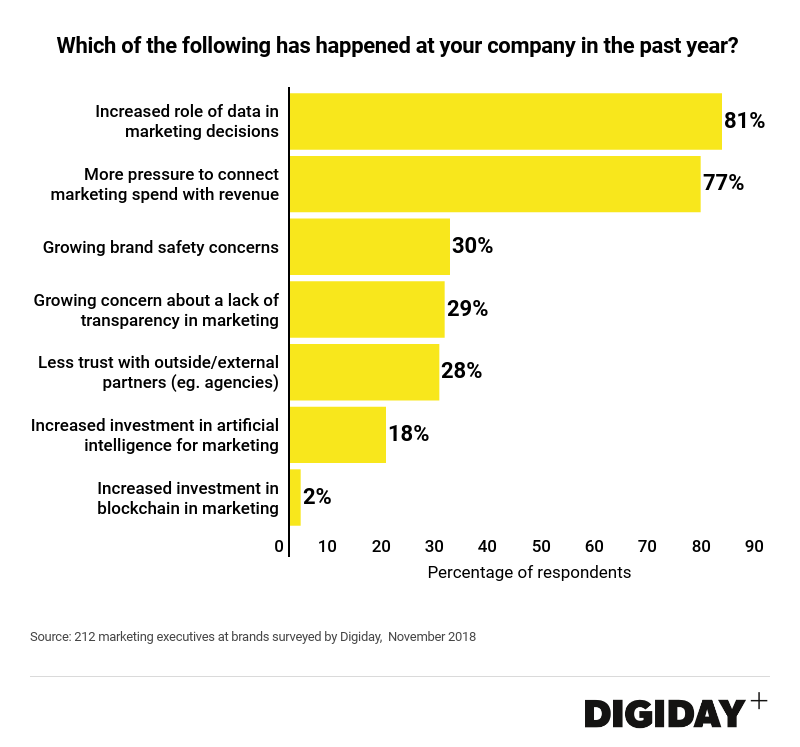Save 50% on a 3-month Digiday+ membership. Ends Dec 5.
Digiday Research: Marketers are under pressure to use data to make investment decisions

This research is based on unique data collected from our proprietary audience of publisher, agency, brand and tech insiders. It’s available to Digiday+ members. More from the series →
Marketers are under more pressure than ever to show their homework, according to a Digiday survey.
Seventy-seven percent of 212 brand marketers surveyed by Digiday this November said the pressure to connect marketing spend with revenue results has grown in the past year.
That pressure is part of a larger movement to bring more data and analysis to marketing decisions. Eighty-one percent of marketers said they have seen an increased role of data in decision making. Overall, marketers are under more pressure to make it count, something that’s changing the very role of brand marketers within an organization, thanks to scarcer resources and at least on paper, a move towards a little more scientific rigor as to what’s moving the needle.
There are several reasons why marketers are feeling the heat to connect marketing spend with revenues. Limited transparency in media buying have jolted marketers into questioning the efficacy of certain advertising channels. Meanwhile Procter and Gamble was able to increase sales while simultaneously cutting back over $100 million on ad buying. Because of this, CEOs are starting to wonder if their marketing budgets are profit centers or cost centers.
And when in doubt, marketing is generally first to go under the microscope. “The economy has been so good for so long, the natural thing for companies to do is find what’s working and figure out how to prolong that. For many, marketing budgets are a good place to start,” said Vic Drabicky, CEO and co-founder of January Digital, an agency that operates as an in-house marketing consultancy for brands. As companies tighten their belts to face growing uncertainty in the global economy, culling things likes ineffective marketing spending could be at the top of some companies’ lists.
Resulting from that pressure, marketers are increasing spending on tools and platforms that can prove their marketing budgets are having the desired impacts. Gartner research on CMOs this past November found that marketers’ spending on technology will be roughly 30 percent of their total budget and their largest expense. Meanwhile in 2018, Forrester forecasted that the percent of their budget allocated to marketing technologies by U.S. marketers will increase 27 percent over the next four years.

Ad position: web_incontent_pos1
In some areas like creative development, it might be impossible for marketers to draw a straight line from marketing budgets to revenues regardless of what technologies marketers purchase. One in-house content marketer for an advertiser told Digiday they struggled to get the necessary funding because decisions-makers could not see an immediate return on their investments for things like video production.
Other issues like cookie bombing, a method of attribution scamming, obfuscate the results of digital campaigns, making it difficult for marketers to understand what ads and parts of their spending is actually having an impact.
But Drabicky warned marketers obsessed with connecting the dots between their budgets and revenue that doing so is an imperfect science at best. “It’s an effort in futility to try to connect everything 100 percent certainty. It’s more about doing the right thing,” he advised.
Instead, he recommended advertisers look to “combine brand awareness and performance campaigns under one roof.” Brand awareness campaigns by nature have always been harder to tie to revenue results than direct response campaigns. So by sharing budgets, and using common reporting metrics and technologies, advertisers can take steps to better understand their how their campaigns perform and the impact it is having on their business.
More in Marketing

Ulta, Best Buy and Adidas dominate AI holiday shopping mentions
The brands that are seeing the biggest boost from this shift in consumer behavior are some of the biggest retailers.

U.K. retailer Boots leads brand efforts to invest in ad creative’s data layer
For media dollars to make an impact, brands need ad creative that actually hits. More CMOs are investing in pre- and post-flight measurement.
Ad position: web_bfu
